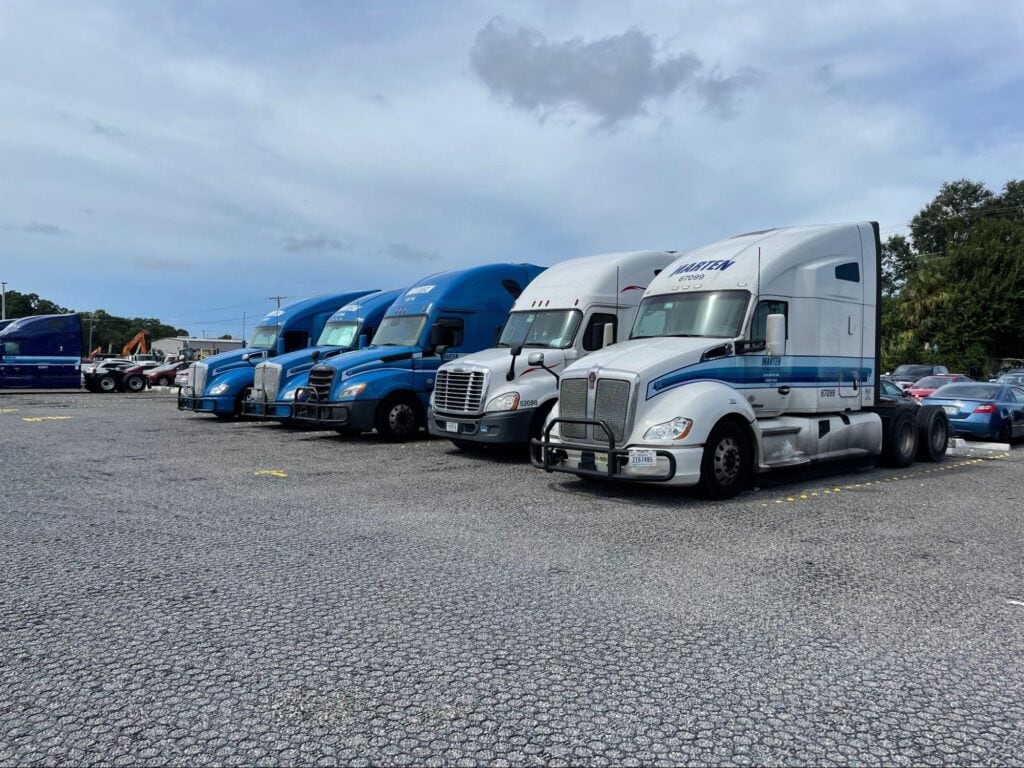
Semi-trailer trucks are the blue whales or elephants of the open road, the respective largest animal in its ecosystem.
Unlike standard passenger vehicles, the sheer size of a semi-truck means that specific accommodations have to be made.
In the same way that we created drawbridges to accommodate the passing of large ships and oil tankers, trucks also require a specific infrastructure to accommodate their substantial size. For example, overpasses, bridges, and tunnels all need to be built at a minimum height to allow for safe truck passage, otherwise there could be costly damage and logistical nightmares.
Parking spaces are no different. Unlike the quaint little parking spots used for passenger vehicles, semi-trucks require much larger areas for safe parking.
Do Trucks Need Bigger Parking Spaces?
The short answer is yes; trucks need bigger parking spaces than standard commuter vehicles.
In addition to the considerable length and girth of the truck itself, most of the time, there is a trailer to take into consideration as well. The average length of a truck and trailer is about seventy feet, with the width measuring about eight and a half feet.
Compare this massive size to the standard size of an SUV, a little over six feet wide and sixteen feet long, and it is easy to see why a semi-truck needs a larger parking space.
What Are Standard Truck Parking Space Sizes?

Truck parking spaces are much larger than passenger vehicle parking spaces, which, on average, measure between a diminutive eight feet wide and eighteen feet long.
Parking spots for semi-trucks must be at least a whopping fifty-five feet long by fourteen feet wide. A parking spot for a semi-truck with an attached trailer needs to measure a colossal seventy-five feet long by fourteen feet wide.
Other Considerations for Truck Parking

In addition to the impressive size of the parking spaces, semi-trucks require some other special considerations in parking areas:
- Truck turning radius
- Parking lot layout
- Backup and pullout space
These are all things that you need to consider when building semi-truck parking.
Using Permeable Pavers for Truck Parking Lots

Permeable pavers, like TRUEGRID PRO PLUS, are a great alternative to concrete or asphalt truck parking lots.
Made from plastic, permeable pavers are interlocking grids that allow grass to grow through them or gravel to fill them. They are 100% pervious, meaning water can flow freely and naturally through the paver and into the ground.
Permeable pavers are engineered with impressive compressive strength; TRUEGRID PRO PLUS, for example, is H20 and HS20+ rated. These ratings mean that TRUEGRID PRO PLUS can handle two-axle or more than two-axle vehicles with an axle loading of 32,000 pounds.
In addition to their substantial strength, permeable pavers are easy to install and immune to many problems that plague concrete and asphalt.
Permeable pavers don’t crack and require minimal maintenance. Standard asphalt parking lots are often susceptible to pooling and puddling after storms, but permeable pavers naturally drain across 100% of their surface area. There is no need for pesky catch basins and drains that clog and flood with permeable pavers.
In addition to high strength, low maintenance, and easy installation, TRUEGRID PRO PLUS pavers are eco-friendly as well. Made from 100% post-consumer recycled PPE, TRUEGRID pavers have saved millions of pounds of plastic from entering landfills and oceans, and their pervious surface has returned millions of gallons of stormwater to the ground.
Gravel

Once installed, permeable pavers are filled with either gravel or grass.
Gravel has a significant advantage for truck parking due to its extremely low maintenance.
Unlike standard gravel surfaces that develop ruts and spill gravel onto adjacent roads and lawns, permeable pavers provide a structure to hold every last stone in place. This means absolutely no ruts and no spillage.
Unlike asphalt, which requires resurfacing, permeable pavers filled with gravel need virtually no maintenance and help meet many environmental standards as well.
Grass
An increasingly popular parking surface, grass creates an incredibly eco-friendly parking area with a pleasing natural look.
Non-reinforced grass fields and lawns are highly susceptible to rutting and becoming unmanageable mud pits, however stabilizing the soil with permeable pavers completely eliminates these problems.
By providing reinforcement, permeable pavers eliminate ruts, mud and protect fragile roots from being crushed by driving, and will create a near-invincible grass surface.
Choose TRUEGRID for Eco-Friendly, Low Maintenance Truck Parking
Founded in 2013, TRUEGRID set out to create practical and robust paving alternatives that could not only compare to traditional asphalt and concrete, but also surpass them with flying colors.
Creating products from 100% post-consumer recycled PPE and manufacturing them 100% in the USA, TRUEGRID has prevented millions of pounds of plastics from entering landfills and contaminating water supplies.
With their entire line of products, including the PRO LITE, PRO PLUS, and ROOT, TRUEGRID has products for everything from residential walkways to commercial parking lots and roads.
Want to learn how to use TRUEGRID for your home or commercial project? Visit their site, reach out today, or get a free online estimate from the comfort of your own home and find out how TRUEGRID can be true to your project and true to the environment!



